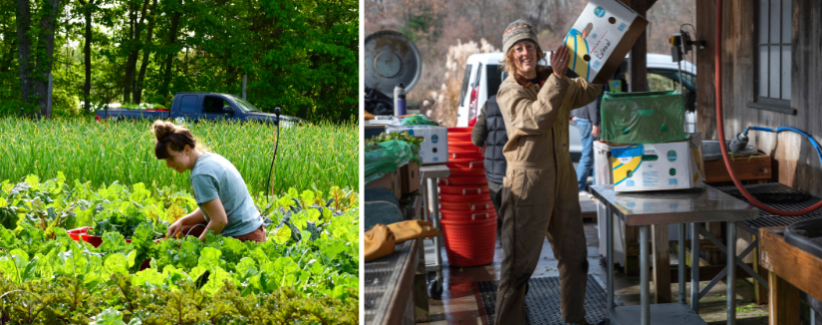Farming for Hunger Relief

Farmers keep the world nourished. However we get the fruits and vegetables that we eat, we know that they arrive to us thanks to people who work with the soil, sun, and rain to bring crops from seed to harvest.
Uniquely, Gaining Ground’s farmers know that the produce they grow goes exclusively to people who face barriers to accessing nutritious foods. We asked this year’s team how growing for hunger relief affects the way they farm and the way they feel about their work as farmers.
Here’s what they told us:
Anna Kelchlin
On the whole, I feel honored that I am able to grow food for people no matter the situation they might find themselves in at any particular point in time. I strongly believe everyone should have access to food that is deeply nourishing on a physical, mental, emotional, and spiritual level—both to the human and our environment. It brings me joy to know that by feeding people in this local and sustainable way, it connects us—humans and land—together. “Farm to table” food should not just be for people who can afford to go to a fancy restaurant. In growing for hunger relief, I feel how essential this work is and it gives me motivation to continue this as my life’s work.
On a more technical level, since hunger is an issue in our area and there is endless demand for our produce, it is not necessary for us—as it is for other small farms—to think about how we will market or sell the produce we grow. We can harvest in bulk amounts like a wholesale farm. And, in turn, we can replant into the cleared bed that same week or sometimes the same day. We have virtually no waste. Remember, everything transforms! We can also grow a diversity of vegetables, which is an extremely important part of how we farm. There is strength and resilience in diversity.

Avery Indermaur
Farming for hunger relief makes the work of growing food even more fulfilling. Not only are we nurturing the soil and ecosystem through environmentally sustainable practices, but we are working toward a more socially and economically sustainable food system by helping provide access to healthy food for those who need it. The hunger-relief aspect of our mission has also allowed me to learn more about food insecurity, food access, and the work being done—and that needs to be done—to address these issues. I am so grateful to be part of such a passionate group of women working to make a positive impact in this space.
Rae Axner
I have felt very fortunate to work on a farm that donates all of its produce. All food production is important and vital to our communities. But it is painful that many small-scale organic farms are only able to provide their nutrient-rich, local produce to those who can afford to pay a premium—which is what this stuff is really worth! I am glad that Gaining Ground exists, that our donors make it possible for our partners to receive this produce, and that I get to be a part of this unique food supply chain.
I am also keenly aware of the bigger structural underpinnings that keep our food system dysfunctional, hurting the people who can’t afford produce like ours as well as the small-scale farmers who struggle to afford access to land, inputs, and fair wages for their farmers. Our national agriculture policy favors industrial monocrop farming while small- to medium-size diversified growers are not able to charge what their product is truly worth. I grow food because I love working outside with my body and because I love doing something that is necessary for our survival as human beings. But I also want to see a world where everyone has access to the kinds of food we grow, and where anyone who wants to farm can pursue that dream.

Erin Espinosa
Growing food for people experiencing food insecurity is highly motivating. From seeding in the greenhouse to packing produce in the wash station, I am determined to grow the most high-quality food that I can, knowing that it will be consumed by someone who needs it and won’t go to waste. The people who eat our food are mostly individuals with lower incomes that likely undergo financial stress. My job is to grow food that brings joy and ease in the kitchen. Growing food solely for people experiencing food insecurity feels valuable and necessary.
Kari Bender
Everyone has the right to fresh, healthy food. Growing for hunger relief encourages me to keep my eye on the bigger goal of disrupting the injustices within our food system, which make such food inaccessible to a significant portion of the population. It reminds me to reflect on my privilege and consider how I can use my skills and resources off the farm to work towards a more equitable future.

Sarah Lichtman
It’s easy to feel helpless when the news contains crisis after crisis. Growing food, and particularly growing food for people who wouldn’t otherwise have access to it, is a daily balm to that sense of helplessness. It’s hard to feel like your work is meaningless when you can pull a carrot from the soil and know it will nourish someone who needs that nourishment.
Chrissie Edgeworth
I am thankful every day for the partner organizations we work with that do the work of distributing the produce we grow. As a farmer, it’s nice to know that we can focus on the growing of the food and trust that there are folks in the community doing the work to make sure that the barriers to accessing nutritious food are broken down and that people are getting food that they’re excited about. I hope that one day hunger-relief farms don’t exist because we’ve built a society in which hunger doesn’t exist. But until that day, I’m grateful for the network of people keeping one another fed against all odds.